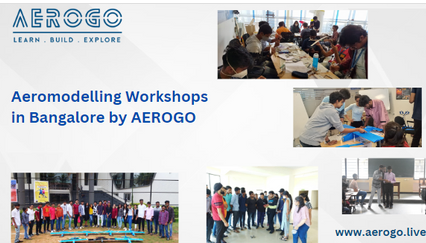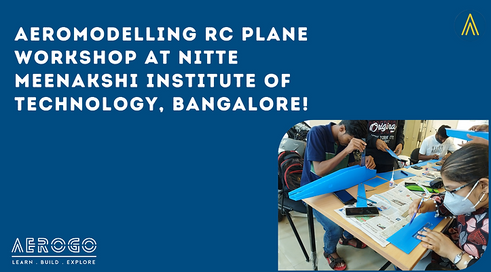Aeromodelling RC Plane Workshop at JNTU Hyderabad
- lahari g
- Nov 9, 2023
- 6 min read
Updated: Nov 20, 2023
In the realm of aeromodelling enthusiasts and those aspiring to take to the skies, the fascination with RC (Remote-Controlled) planes is irrefutable. These exceptional miniature aircraft serve as a conduit to the heavens, granting individuals the exhilarating experience of flight while firmly rooted on the ground. The craft of aeromodelling springs to life as these diminutive marvels ascend into the sky, skillfully controlled by the devoted hands of hobbyists. It is a realm where aspirations of soaring to great heights and venturing into the celestial expanse find their embodiment.
In the heart of Hyderabad, the annual technical fest at JNTU College witnessed an aeromodelling revolution of sorts as they hosted their very first RC (Remote-Controlled) Aircraft Workshop. This two-day event promised to be a treat for aeromodelling enthusiasts and tech geeks alike. From the fundamentals of aeromodelling to the euphoria of seeing your creation soar through the skies, the workshop had it all.
RC Plane Workshop Day 1: Theory and Hands-On Construction Unveiled
Demystifying Aeromodelling: A World of Possibilities
The first day of the workshop kicked off with an engaging theory session. Seasoned trainers were on hand to impart knowledge about the intricacies of aeromodelling. They started with the basics, explaining the principles that govern the flight of an RC aircraft. From lift and thrust to drag and gravity, participants gained a comprehensive understanding of how these forces interacted to keep their planes in the air.
AEROMODELLING is a fascinating hobby that involves the construction and flying of model aircraft. It encompasses the creation of scaled-down replicas of real airplanes as well as the design and construction of original aircraft models. Aeromodelling enthusiasts have a wide range of options, including gliders, airplanes, helicopters, and drones, to explore and showcase their craftsmanship and piloting skills.
To understand aeromodelling, it's essential to grasp the principles of flight. These principles explain how an aircraft is able to fly and remain airborne. There are four primary principles: lift, thrust, drag, and weight.
Lift is the force that counters the weight of an aircraft, allowing it to stay aloft. It is generated by the wings' interaction with the air flowing over them. The wing's shape, known as an airfoil, is specifically designed to create lift by establishing a pressure difference between the upper and lower surfaces of the wing.
Thrust is the forward force that propels an aircraft through the air. It is typically generated by engines such as propellers. By generating thrust greater than the drag force, an aircraft can accelerate and maintain its motion through the air.
Drag is the resistance or force that opposes the motion of an aircraft through the air. It arises from the interaction between the aircraft's structure and the air. There are two main types of drag: parasitic drag, which includes form drag (resulting from the aircraft's shape) and skin friction drag (caused by the friction between the air and the aircraft's surface), and induced drag, which is generated by the lift-producing devices such as wings.
Weight is the force exerted by gravity on an aircraft, acting vertically downward through the aircraft's center of gravity. To sustain flight, the lift force must be equal to or greater than the weight force.
An RC (Remote-Controlled) plane is a small-scale aircraft that is controlled remotely by a pilot using a handheld transmitter. These planes are powered by electric motors and are used for various purposes, including recreational flying, aerobatics, aerial photography, and even competitive racing. RC planes come in a wide range of sizes and styles, from beginner-friendly trainers to highly maneuverable aerobatic models. Pilots use the transmitter to control the plane's throttle, direction, and various flight surfaces like the ailerons, elevators, and rudder. Flying RC planes is a popular hobby that combines the thrill of aeromodelling with the precision of remote control.

Electronics in Flight: Navigating the RC Plane World
As the day progressed, the trainers delved into the anatomy of an RC aircraft. They elucidated the various components, their functions, and the terminologies associated with this exciting field. Enthusiastic participants were introduced to the fuselage, wings, tail, and other vital parts that collectively make an RC plane take flight.
The electronic intricacies of RC planes were unveiled by experts in the field. Transmitters, receivers, motors, and batteries were no longer enigmatic components but comprehensible instruments essential for controlling flight. The complexity of electronics faded away as students grasped the inner workings of their soon-to-be airborne creations.
RC plane electronics consist of essential components that enable remote control and operation of the aircraft. These components include:
1. Transmitter: The handheld device used by the pilot to send control signals to the RC plane. It typically has joysticks or control sticks for managing throttle, ailerons, elevators, and rudder.
2. Receiver: Installed in the RC plane, the receiver receives signals from the transmitter and relays them to the various servos and electronic speed controller (ESC) to execute commands.
3. Servos: Small motors that control the movement of control surfaces like ailerons (for roll), elevators (for pitch), and rudder (for yaw). Servos translate electrical signals into mechanical movements.
4. Electronic Speed Controller (ESC): Manages the speed and direction of the electric motor or engine, controlling the plane's propulsion. It interprets commands from the receiver to adjust the throttle.
5. Battery: Powers the electronics, including the receiver, servos, and ESC. The type and capacity of the battery depend on the plane's power requirements.
These electronics work together to provide precise control and maneuverability to the RC plane, allowing pilots to perform various aerial maneuvers and enjoy a dynamic flying experience.

Hands-On RC Aircraft Construction: Crafting Dreams with Expert Guidance
The highlight of the day, however, was the hands-on construction phase. Armed with raw materials and guided by expert trainers, participants embarked on the exhilarating journey of building their very own RC aircraft. With precision and patience, they assembled the wing, tail, and fuselage. The trainers provided valuable insights and tips, ensuring that every step was a learning experience.
RC Plane Workshop Day 2: Construction and the Thrill of Soaring Flight
On the second day, the atmosphere was charged with excitement as participants prepared to bring their creations to life. The parts meticulously constructed on the first day were now assembled to form a complete RC aircraft. The trainers supervised the assembly process, ensuring that safety and functionality were top priorities.
With the aircraft fully assembled, attention turned to the installation of the electronic components. Participants learned how to connect and configure the motors, and servos. This phase of the workshop showcased the integration of theory into practice, as participants gained hands-on experience in setting up the electronics.
The culmination of this incredible journey was the moment when these RC planes took to the skies. The field echoed with the sound, and the excitement was palpable as each participant guided their aircraft into the air. For many, it was a moment of sheer exhilaration and achievement as they witnessed their creations soaring gracefully overhead.
Aeromodelling Workshop: Student Testimonials
At the end of the workshop, a moment of reflection and gratitude unfolded. The participants were invited to share their testimonials, and their faces lit up with excitement and satisfaction. The RC Plane workshop had left an indelible mark on their minds, igniting a newfound passion for aeromodelling. Their testimonials echoed with gratitude for the opportunity to delve into this captivating hobby and the immense joy it had brought them.
Student 1:
Student 1: I had a blast at the aeromodelling workshop! The instructors were not only knowledgeable but also very patient in explaining the concepts. I loved the practical sessions where we got to construct our own model planes. It was an excellent way to gain insight into the world of aviation and engineering. I highly recommend this workshop to anyone interested in aeromodelling.
Student 2: Participating in the aeromodelling workshop was an incredible experience. I learned so much about designing, building, and flying model aircraft. The hands-on approach and guidance from the instructors made it easy for a beginner like me to get started. I'm now hooked on aeromodelling and can't wait to build my own aircraft.
Conclusion: Dreams Ascend to New Heights
The first RC Aircraft Workshop at JNTU College's annual technical fest in Hyderabad was nothing short of a triumph. It provided participants with a comprehensive understanding of aeromodelling and the thrill of hands-on construction. From learning the basics to witnessing their aircraft take flight, participants experienced the entire spectrum of the RC aircraft hobby.
As the workshop concluded, participants were left with not just memories but also a profound sense of accomplishment. They had taken their first steps into the world of RC aeromodelling, and the sky was now the limit for their dreams and ambitions.
In retrospect, this workshop was a testament to the power of learning, collaboration, and passion. It showcased how a group of dedicated trainers and enthusiastic participants can come together to create something truly remarkable. JNTU College's first RC Aircraft Workshop will undoubtedly be remembered as a milestone event, inspiring generations of aviation enthusiasts to come.

Look around our shop to get the materials and DIY model aircraft kits needed to build your own glider- https://www.aerogo.live/shop
To grow your Knowledge go through AEROGO's video library- https://www.aerogo.live/video-library
Explore more Blogs and stay tuned- https://www.aerogo.live/blog
Sponsor to enlighten young minds in rural areas - contact@aerogo.live



















Comments